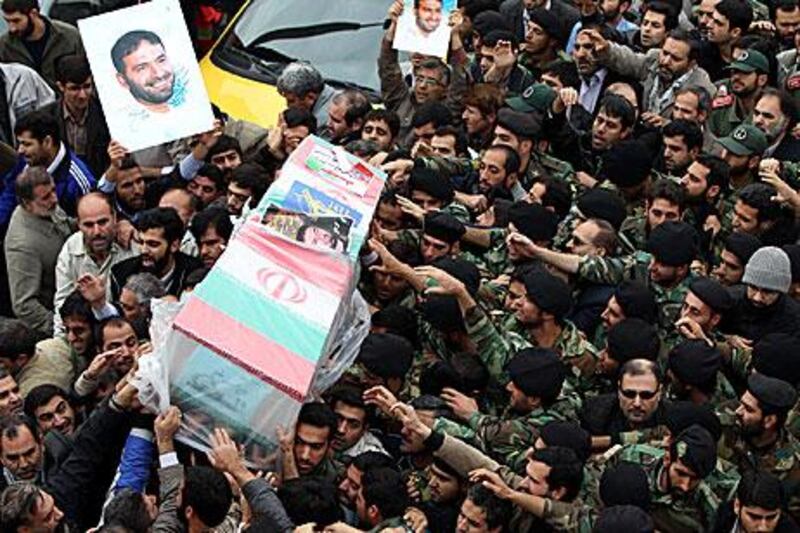TEL AVIV // Israel yesterday stepped up pressure on its western allies to take more aggressive steps to curb Iran's nuclear ambitions.
The defence minister, Ehud Barak, claimed Iran was less than a year away from developing nuclear arms.
His statement was part of an intensive diplomatic campaign escalated by Israel following a report this month by the UN nuclear watchdog, which said Tehran appeared to have designed a nuclear bomb and was still conducting secret research.
Iran dismissed the report as "unprofessional, unbalanced, illegal and politicised".
Some legislators have been urging the country's leadership to cease all cooperation with the UN agency.
Mr Barak, who made his comments during an interview with the US television channel CNN, seemed to urge the international community to take urgent action against Iran, which he said was intentionally expanding its nuclear programme.
He said: "It's true that it won't take three years, probably three quarters, before no one can do anything practically about it because the Iranians are gradually, deliberately, entering into what I call a zone of immunity, by widening the redundancy of their plan, making it spread over many more sites with many more hidden elements."
Israel's efforts to impose more sanctions on Iran reflect a fear by its leaders that their country would be a prime target for Iranian nuclear weapons.
While Israeli officials have been at the forefront of diplomatic efforts to convince the international community to take more action against Iran, the country was also widely speculated to be behind covert operations that appeared to be aimed at Iran's nuclear programme.
Some suspect the Israeli intelligence agency, Mossad, is linked to an explosion last week at an Iranian military base that killed 17 members of the Iranian Revolutionary Guard Corps, including an officer viewed as the architect of Iran's missile defence systems.
Iran has conceded the bombing happened as a result of research being conducted on weapons that could attack Israel. It vehemently denied that Israel or the US may have been behind the explosion.
Mr Barak has been coy about possible Israeli involvement in the incident, telling an Israeli radio station a day after the blast: "May there be more like it."
Iran, the second-biggest Opec producer, has dismissed charges it planned to make nuclear arms, insisting it only wants atomic power and lambasting the evidence against it as fake.
Amid the tensions, Iran began conducting a four-day training exercise on Friday to test its defences in drills taking place over 800,000 square kilometres in the country's east, Iranian state TV said.
Mr Barak, a former prime minister viewed as a confidante of the current premier, Benjamin Netanyahu, avoided making a direct confirmation or denial on possible Israeli plans to launch an air raid on Iran's nuclear facilities during the CNN interview. He said: "I don't think that is a subject for public discussion."
Mr Barak added that Iran's nuclear programme could drive a nuclear arms race in the Middle East, resulting in nations such as Egypt, Saudi Arabia and Turkey seeking nuclear weapons.
"The countdown toward nuclear materials in the hands of terrorists will start, even if it takes half a generation. But more than this, they will use the nuclear umbrella to kind of intimidate neighbours all around the Gulf to sponsor terror."
It remains unclear how much pressure will be placed on Tehran, since Russia and China have taken a milder stance than western powers on how aggressive the sanctions on Iran should be, arguing dialogue is the best way to solve the standoff.
The administration of the US president, Barack Obama, has been helping Israel's diplomatic efforts for tougher punitive measures. On Saturday, Tom Donilon, the US national security adviser, said that Iran's isolation was now "unprecedented".
Washington also appears to have lined up new unilateral sanctions aimed at Iran's multi-billion dollar petrochemical industry, which could be unveiled as early as today, Reuters reported yesterday.
Iran's petrochemical industry had exports of US$8.6 billion (Dh31.5bn) last year, according to the website of the oil ministry.
The sanctions would threaten firms seeking involvement with Iran's petrochemical industry with measures such as depriving them of access to the US market. The report added that there are already similar sanctions barring banks and other financial firms with business in the US from expanding into Iran.





